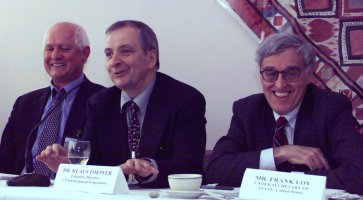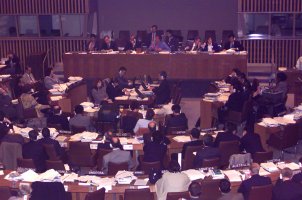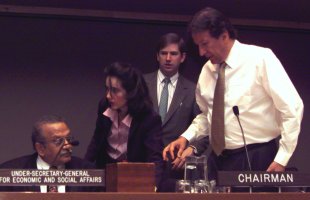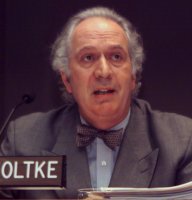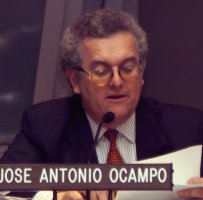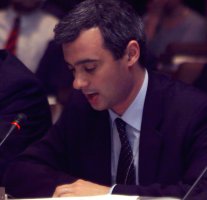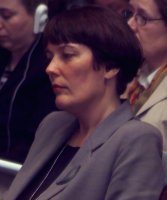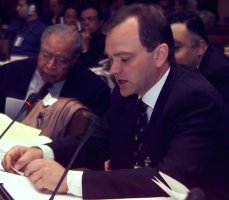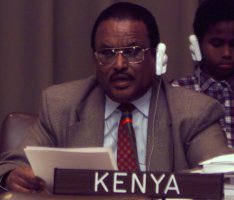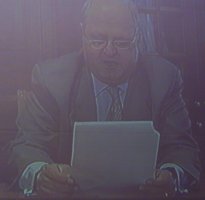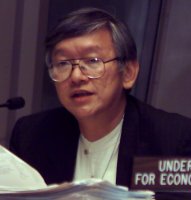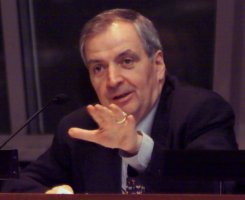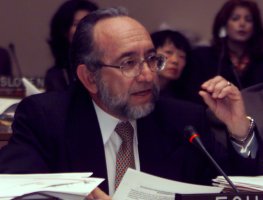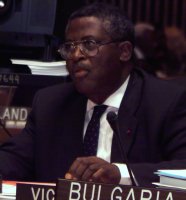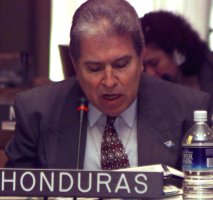| |
| High-Level Segment on Finance and Investment |
|
Under-Secretary-General
for Economic and Social Affairs Nitin Desai with Colombian delegates
and Chair Mayr
|
 Konrad von Moltke, Senior Fellow, International Institute
for Sustainable Development (IISD) recommended, inter
alia: international discipline for financial markets, ensuring
a balance between investor rights and public obligations in a non-discriminatory
manner; more constructive use of regional economic agreements; including
investment provisions in multilateral environmental agreements (MEAs);
and pursuing this debate in the CSD
Konrad von Moltke, Senior Fellow, International Institute
for Sustainable Development (IISD) recommended, inter
alia: international discipline for financial markets, ensuring
a balance between investor rights and public obligations in a non-discriminatory
manner; more constructive use of regional economic agreements; including
investment provisions in multilateral environmental agreements (MEAs);
and pursuing this debate in the CSD |
|
|
|
 Jose Antonio Ocampo, Executive Sectretary, Economic Commission
for Latin America and the Caribbean (ECLAC), recommended,
inter alia: international cooperation to meet ODA targets; developing
criteria for FDI; directing FDI to clean energy projects; improving
cooperation between finance and environmental ministries; and
strengthening public institutions.
Jose Antonio Ocampo, Executive Sectretary, Economic Commission
for Latin America and the Caribbean (ECLAC), recommended,
inter alia: international cooperation to meet ODA targets; developing
criteria for FDI; directing FDI to clean energy projects; improving
cooperation between finance and environmental ministries; and
strengthening public institutions.
|
|
 José Socrates Carvalho Pinto de Sousa (Portugal), on behalf of the
EU, emphasized:
the importance of domestic resources as the main source of financing;
greater consideration of international private financial flows;
the need for a stable, predictable and transparent investment climate;
the need to reverse declining ODA and improve its quality through
more efficient delivery, improved allocation and better coordination;
the role of the GEF; and implementation of financing pledges for
Heavily Indebted Poor Countries (HIPCs).
José Socrates Carvalho Pinto de Sousa (Portugal), on behalf of the
EU, emphasized:
the importance of domestic resources as the main source of financing;
greater consideration of international private financial flows;
the need for a stable, predictable and transparent investment climate;
the need to reverse declining ODA and improve its quality through
more efficient delivery, improved allocation and better coordination;
the role of the GEF; and implementation of financing pledges for
Heavily Indebted Poor Countries (HIPCs).
|
|
|
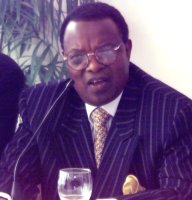
|
 Hassan
Adamu, Nigerian Environment Minister, for
the G-77/China, urged donor countries to cancel or substantially
reduce the debt burden and to meet their Agenda 21 financial commitments.
Hassan
Adamu, Nigerian Environment Minister, for
the G-77/China, urged donor countries to cancel or substantially
reduce the debt burden and to meet their Agenda 21 financial commitments.
|
 Satu
Hassi, Minister of the Environment and Development and Development
Cooperation (Finland), underlined
the importance of the quality of ODA and the need for developing
countries to work on sustainable development strategies.
Satu
Hassi, Minister of the Environment and Development and Development
Cooperation (Finland), underlined
the importance of the quality of ODA and the need for developing
countries to work on sustainable development strategies. |
|
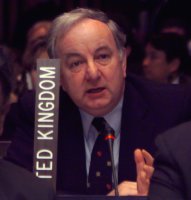 |
 George
Foulkes, Parliamentary Under-Secretary of State for International
Development (United Kingdom) raised questions about the High-Level
dialogue exercise and called for careful consideration of the CSD's
future arrangements to ensure that the Commission adds value to the
debate on finance and investment. On ODA, he called for consideration
of developing country spending to ensure prioritization of the social
sector and the environment.
George
Foulkes, Parliamentary Under-Secretary of State for International
Development (United Kingdom) raised questions about the High-Level
dialogue exercise and called for careful consideration of the CSD's
future arrangements to ensure that the Commission adds value to the
debate on finance and investment. On ODA, he called for consideration
of developing country spending to ensure prioritization of the social
sector and the environment. |
 Jan
Trojborg, Minister for Development Cooperation (Denmark)
called for consideration of financing for sustainable development
at the Financing for Development and Rio+10 conferences, and highlighted
the role of the GEF. HE discussed the considerable progress made
in securing funds for the uncovered multilateral costs of the enhanced
HIPC initiative and said he was seeking an additional Danish contribution
of 19 million US dollars to the HIPC Trust Fund in the World Bank
Jan
Trojborg, Minister for Development Cooperation (Denmark)
called for consideration of financing for sustainable development
at the Financing for Development and Rio+10 conferences, and highlighted
the role of the GEF. HE discussed the considerable progress made
in securing funds for the uncovered multilateral costs of the enhanced
HIPC initiative and said he was seeking an additional Danish contribution
of 19 million US dollars to the HIPC Trust Fund in the World Bank |
|
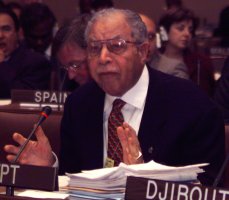 |
 Mostafa Tolba speaking on behalf of Egypt underlined the importance of defining concepts such as good
governance. Chair Mayr supported Egypt's concerns about the need for
common understanding among participants in the High-Level Segment.
Responding to a question from Egypt, Konrad von Moltke noted
the distinct characteristics required for investment disciplines,
as investors become 'economic citizens' and acquire rights in host
countries.
Mostafa Tolba speaking on behalf of Egypt underlined the importance of defining concepts such as good
governance. Chair Mayr supported Egypt's concerns about the need for
common understanding among participants in the High-Level Segment.
Responding to a question from Egypt, Konrad von Moltke noted
the distinct characteristics required for investment disciplines,
as investors become 'economic citizens' and acquire rights in host
countries. |
 T.R.
Baalu, Minister of Environment and Forests, India, lamented
the unaffordable cost of technology transfer.
T.R.
Baalu, Minister of Environment and Forests, India, lamented
the unaffordable cost of technology transfer. |
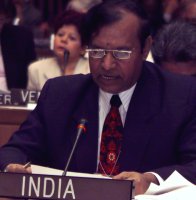 |
|
|
Kenya
said that poverty eradication requires sound national and international
macro-economic policies, and called for deeper and broader debt relief.
|
The Philippines:
Governor J. Antonio Leviste, Board of Investments, Undersecretary
Crisanto Collado, Department of Agriculture, and Undersecretary
Jeremias Paul, Department of Finance
The Philippines
called for a mechanism allowing the active participation of finance
ministers and officials.
|
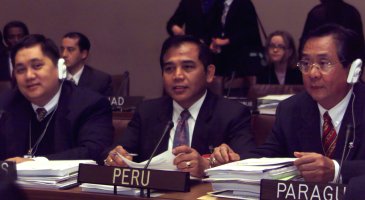
|
| High-Level Segment on Globalization and Trade |
|
|
 Delegates watched a videotaped address to the CSD from Michael
Moore, Director-General of the WTO. Moore
suggested
that the WTO may contribute to sustainable development through:
trade agreements that provide scope for pursuing environmental
objectives that do not trade-discriminatory; activities of the
WTO Committee on Trade and Environment; and the introduction of fresh
initiatives on poverty, for example, addressing agricultural trade
barriers.
Delegates watched a videotaped address to the CSD from Michael
Moore, Director-General of the WTO. Moore
suggested
that the WTO may contribute to sustainable development through:
trade agreements that provide scope for pursuing environmental
objectives that do not trade-discriminatory; activities of the
WTO Committee on Trade and Environment; and the introduction of fresh
initiatives on poverty, for example, addressing agricultural trade
barriers.
|
 Martin
Khor, Director, Third World Network recommended: rapid
reduction and elimination of developed countries' export subsidies;
applying the principle of common but differentiated responsibilities;
addressing problems arising from the TRIPs agreement; overhauling
the WTO decision-making system and Secretariat prior to the pursuit
of new issues; and increasing the CSD's capacity to act as an alternative
forum for the discussion of trade, development and the environment.
Martin
Khor, Director, Third World Network recommended: rapid
reduction and elimination of developed countries' export subsidies;
applying the principle of common but differentiated responsibilities;
addressing problems arising from the TRIPs agreement; overhauling
the WTO decision-making system and Secretariat prior to the pursuit
of new issues; and increasing the CSD's capacity to act as an alternative
forum for the discussion of trade, development and the environment. |
|
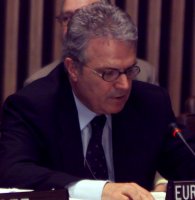 |
 John
Currie, Director-General of Environment, European Commission,
reiterated its commitment to duty and quota-free access for essentially
all exports from less-developed countries; recommended that MEAs and
WTO agreements have equal status; called for clarity on the relationship
between trade rules and the Rio principles (notably the precautionary
principle); encouraged the development and use of sustainability impact
assessments (SIAs); and advocated enhanced international cooperation.
John
Currie, Director-General of Environment, European Commission,
reiterated its commitment to duty and quota-free access for essentially
all exports from less-developed countries; recommended that MEAs and
WTO agreements have equal status; called for clarity on the relationship
between trade rules and the Rio principles (notably the precautionary
principle); encouraged the development and use of sustainability impact
assessments (SIAs); and advocated enhanced international cooperation.
|
 Nigeria, for the
G-77/China, called on developed countries to:
improve market access to developing country exports; assist developing
countries to benefit from FDI and ODA, especially in promoting environmentally
sound technologies; and promote the participation of developing countries
in the trade decision-making process.
Nigeria, for the
G-77/China, called on developed countries to:
improve market access to developing country exports; assist developing
countries to benefit from FDI and ODA, especially in promoting environmentally
sound technologies; and promote the participation of developing countries
in the trade decision-making process. |
 Klaus
Topfer, UNEP Executive Director summarized key
points of importance. Namely, capacity building joint initiatives
with UNCTAD for concrete benefits to developing countries;
assessment of the effects of trade globalization (see side event
on Sustainable Assessment);
multilateral environmental agreements (MEAs) on building
relationships with the WTO; and principles such as the
Precautionary Principle (POPs) and Advanced Informed Agreement (Biosafety
Protocol), and most of all, how to translate trade liberalization
into the eradication of the most toxic disease : poverty.
Klaus
Topfer, UNEP Executive Director summarized key
points of importance. Namely, capacity building joint initiatives
with UNCTAD for concrete benefits to developing countries;
assessment of the effects of trade globalization (see side event
on Sustainable Assessment);
multilateral environmental agreements (MEAs) on building
relationships with the WTO; and principles such as the
Precautionary Principle (POPs) and Advanced Informed Agreement (Biosafety
Protocol), and most of all, how to translate trade liberalization
into the eradication of the most toxic disease : poverty. |
|
Ecuador
(left) said increased equity and fairness was needed to build
trust and supported the use of sustainability reviews in trade
negotiations, noting the recent WWF workshop in Quito, Ecuador.
Cameroon
(right)
called
on the international community to guarantee prices for certain
forest products, in order to protect forests.
|
|
David
Hale (United States), welcomed the spirit of dialogue, observing
that economically successful trade practices must be environmentally
sound, fair, just, and contribute to poverty eradication. He suggested
a focus on: tackling poverty alongside health, labor, food and land
issues; and on good governance, taking the environmental impact
of decisions into account in decision-making. He advocated win-win
approaches such as the CDM proposed under the Kyoto Protocol.
|
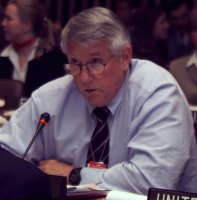 |
|
|
Honduras
emphasized that trust in national processes is a prerequisite to trust
in international processes, highlighting the importance of transparency
and the globalization of solidarity. |
|
Dick
Balhorn, Department of Foreign Affairs and International Trade
(Canada), observed a lack of coherence in national positions
adopted at different negotiations, including those on the Biosafety
Protocol and at the WTO, and said that coherence must first be established
at the national level. He commended UNEP's work on trade and environment
agreements and expressed frustration that it was not a joint effort
involving the WTO. On ambitions for Rio+10, CANADA suggested the
production of guidelines to advance understanding of the conditions
where trade and environment policies can be mutually supportive.
|
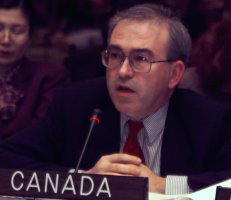 |
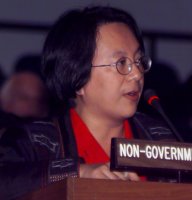 |
The
Indigenous Peoples' Caucus highlighted problems caused by
trade and investment liberalization.
The International
Center for Trade and Sustainable Development (ICTSD) highlighted
the lack of clear policy in the multilateral trade system.
|
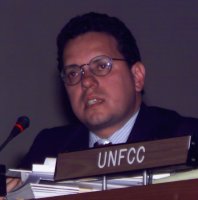 |

 ENB
Summary of Ad Hoc Open-Ended Intergovernmental Group of Experts on Energy
and Sustainable Development ENB
Summary of Ad Hoc Open-Ended Intergovernmental Group of Experts on Energy
and Sustainable Development
 CSD-8
Intersessionals CSD-8
Intersessionals
 Linkages
CSD page Linkages
CSD page
 UN
- CSD website with official
documents UN
- CSD website with official
documents
 ENB's
"Introduction to CSD" ENB's
"Introduction to CSD"

|


